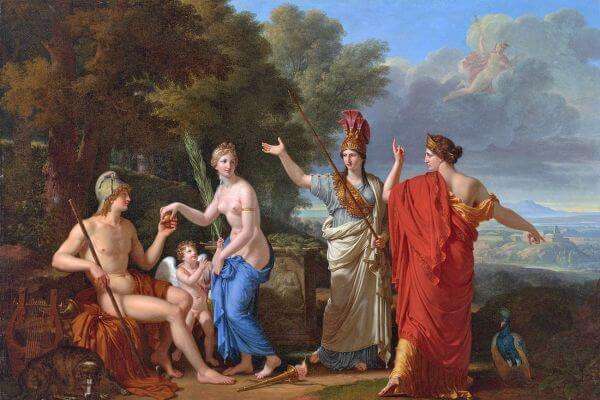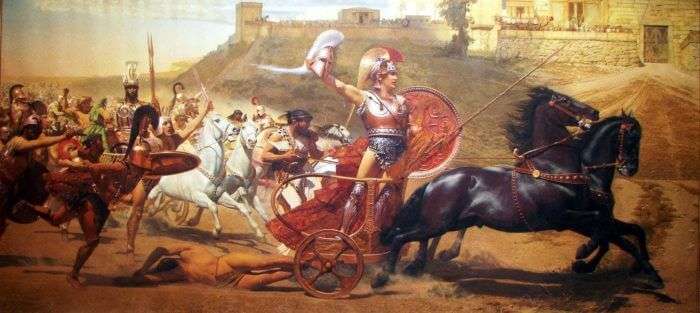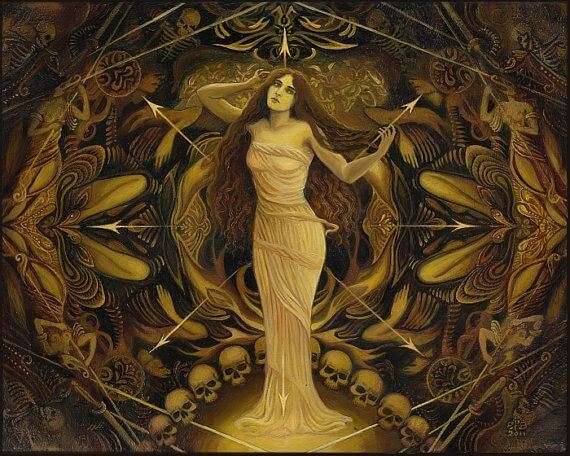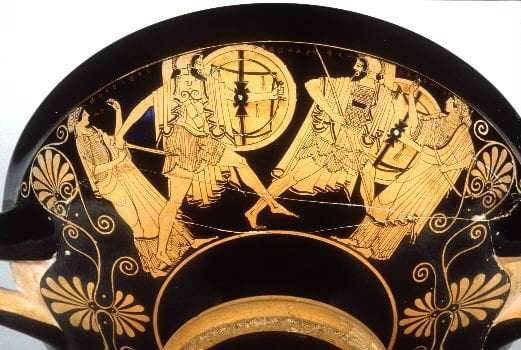1. Introduction
Greek mythology, a treasure trove of captivating tales and characters, has shaped the very fabric of Western culture and thought. From the mighty Zeus reigning from Mount Olympus to the cunning Odysseus navigating treacherous seas, each story adds depth to this intricate tapestry. Among the myriad of deities, Eris stands out—often overshadowed by her more celebrated counterparts, yet equally enthralling. Recognized as the goddess of strife and discord, Eris’s role in ancient tales is both complex and profound, weaving a narrative that intertwines chaos with pivotal moments in mythic history. As we delve into her story, we uncover the layers of intrigue that surround this enigmatic figure.
| Origin | Greek Mythology |
|---|---|
| Classification | Goddess |
| Family Members | Zeus (Father) and Hera (Mother) in some sources; in others, she is the daughter of Nyx (Night) alone or with Erebus. Ares (Brother) and other war deities can be considered as siblings. |
| Region | Greece |
| Associated with | Strife, Discord, Conflict, Competition |
2. Eris’ Origin and Lineage
The birth and lineage of Greek gods often provide invaluable insights into their character and influence. Eris, in her inception, emerges from the very essence of chaos. In ancient texts, she is frequently identified as the daughter of Nyx (Night) and Erebus (Darkness), conceived in the shadowy realms predating the Olympian era. This primordial ancestry places her among the earliest of deities, shaping the cosmos itself.
Eris: An Unparalleled Enigma in Greek Mythology
What truly sets Eris apart from her mythological peers is her multifaceted nature. While many Greek deities are embodiments of virtues or elemental forces, Eris represents a concept both nuanced and universal: discord. Her very existence brings attention to the duality of life—the harmony interspersed with chaos, the calm followed by storms. Unlike gods celebrated for strength or beauty, Eris thrives in the realms of conflict and contention, making her one of the most original figures in the vast pantheon.

3. Major Myths and Stories Associated with Eris
The Golden Apple of Discord
Every myth involving Eris is imbued with intrigue, but none more so than the tale of the Golden Apple. At the grand wedding of Peleus and Thetis, almost all the gods were invited, save for Eris. In a move befitting the goddess of strife, she responded by hurling a golden apple inscribed with the phrase “To the Fairest” into the celebration. This seemingly innocent act set Hera, Athena, and Aphrodite against one another, each believing they deserved the title.
Significance of “To the Fairest” and its Aftermath
The phrase “To the Fairest” is not merely a compliment—it’s a challenge, a test of vanity and pride. It forced the goddesses into a competition, leading them to Paris of Troy for judgment. Eris’s apple did more than stir discord among deities; it sowed the seeds for one of the most legendary wars in mythological history.

Eris and the Trojan War: Strings of Strife
Eris’s indirect influence on the Trojan War is unmistakable. Though Paris chose Aphrodite as the fairest, rewarding him with the love of Helen, it was Eris’s instigation that set the events in motion. The elopement of Helen with Paris served as the catalyst for the decade-long conflict between Troy and the Greek city-states.
Analyzing Eris: Catalyst or Casual Bystander?
While Eris did not directly engage in the Trojan War, her fingerprints are evident throughout. Was her intention purely mischief, or was there a deeper motive? By analyzing her actions, we can deduce that Eris is not just an agent of chaos but a reflection of the inherent conflicts within human nature itself.
Eris and Ares: The Dance of War and Discord
Bound by shared interests, Eris and Ares present a formidable duo in Greek mythology. Eris, with her penchant for sowing discord, and Ares, the fierce god of war, often collaborated on the battlefield, weaving tales of heroism and tragedy.
Synergy of Strife and Battle
Their combined energies were like a force of nature—unpredictable, unstoppable, and often catastrophic. While Ares brought the brute force and strategy of war, Eris added the psychological elements—fear, betrayal, and rivalry. Together, they exemplified the intricate dance between physical conflict and the mental turmoil that accompanies it.

4. Eris in Modern Culture
Eris’ Echoes in Pop Culture
Today, while the world has dramatically transformed from ancient Grecian times, the influence of Eris endures. Modern literature, films, and TV shows frequently reference or draw inspiration from her enigmatic character. Renowned authors have crafted narratives with protagonists mirroring Eris’s cunning and penchant for chaos. In cinema, the alluring tales of golden apples and divine jealousy have been retold with contemporary twists. Even in TV series, particularly those rooted in mythology or fantasy, Eris’s essence often resurfaces, either as a direct representation or a thematic influence.
Eris’ Image Evolution
From ancient vases to modern graphic novels, the portrayal of Eris has seen both evolution and steadfastness. Historically, she was often depicted with her iconic golden apple, symbolizing the strife she could instigate with seemingly benign acts. Over time, as stories evolved and mediums changed, so did her representation. However, what has remained consistent is her essence: a figure of discord, intrigue, and unpredictability.
In analyzing this evolution, it’s evident that while artistic interpretations might vary, the core traits of Eris—those of sowing discord and challenging the status quo—remain untainted. This consistency underscores her universal relevance, reminding us that even in an ever-changing world, certain elements of human nature and societal dynamics remain constant.

5. Symbolism and Interpretation
The Allure of the Golden Apple
Perhaps no symbol is more intrinsically linked to Eris than the golden apple. While it might appear as just a fruit, it embodies the very nature of Eris—subtle yet powerful, innocuous yet transformative. The apple’s shiny allure represents temptation, and its divisive inscription (“To the Fairest”) symbolizes the relative nature of beauty and worth. But deeper still, it acts as a mirror, reflecting the vanity, competitiveness, and susceptibility to pride inherent in both gods and mortals.
Discord: A Double-Edged Sword
When we hear “discord”, the immediate association is often negative, invoking images of chaos, conflict, and disruption. Certainly, in many myths, Eris’s actions lead to turmoil and strife. Yet, there’s a nuanced side to discord, one that goes beyond mere destruction.
Consider the innovation, progress, and growth that can arise from challenging the status quo. When discord challenges established norms, it can pave the way for constructive dialogue, introspection, and societal advancement. Discord, in its constructive form, can act as a catalyst, pushing individuals and societies out of complacency and into realms of creativity and reformation.
In essence, Eris, through her symbolic acts and inherent nature, compels us to recognize and grapple with this duality. She serves as a reminder that discord, while disruptive, can also be a harbinger of necessary change.
6. Lessons from Eris’ Myths
Gleaning Wisdom from Chaos
At first glance, the myths of Eris might seem to revolve around mischief and chaos, but they are imbued with deeper lessons for those willing to look beneath the surface. One of the primary teachings from Eris’s tales is the nature and consequences of unchecked pride. From the battle of the goddesses over the golden apple to the subsequent events leading to the Trojan War, the destructive power of vanity is clear.
Interpreting Conflict as Opportunity
Every instance of discord that Eris introduces into the narrative is not just a challenge but an opportunity. Conflicts, while uncomfortable, force individuals and societies to reevaluate their beliefs, values, and actions. They highlight vulnerabilities, prompting reflection and growth. By understanding the nuanced role of Eris in these tales, one can approach real-life conflicts with a more analytical and constructive mindset.

Influence on Modern Decisions
Embracing the lessons of Eris can have profound implications for modern decision-making, both on personal and societal levels. On a personal front, understanding the consequences of pride, jealousy, and rivalry can guide one towards more introspective and empathetic choices. Societally, recognizing the potential benefits of discord can influence policies and attitudes that foster constructive debate and inclusive decision-making.
Moreover, in today’s age of information overload and divisive narratives, Eris’s stories act as a cautionary reminder. They emphasize the need for discernment, critical thinking, and the acknowledgment that every conflict, no matter how trivial it might seem, has the potential to spiral into larger consequences if not addressed with wisdom and maturity.
7. Conclusion
Eris, often overshadowed in the vast panorama of Greek mythology, emerges as a figure of profound depth and complexity. Her tales, weaving through the tapestry of ancient myths, spotlight the intricacies of human emotions—from vanity and rivalry to introspection and growth. Eris isn’t just the goddess of discord; she represents the multifaceted nature of conflict, challenging and reshaping perceptions. Her stories serve as timeless reminders of the delicate balance between pride and downfall, chaos and evolution. As we stand at the crossroads of history and myth, Eris beckons us to delve deeper into the world of mythologies, not just for tales of gods and heroes, but to unravel the ever-relevant insights into human nature and its myriad manifestations.
